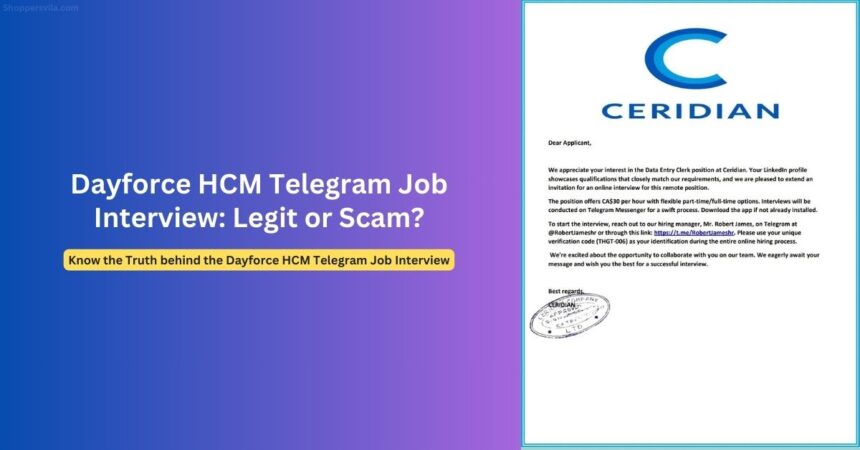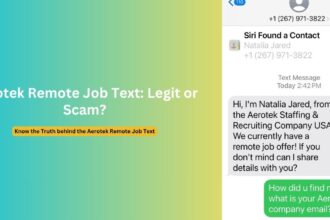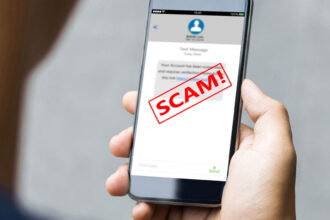In today’s digital job market, cybercriminals are increasingly targeting job seekers with sophisticated recruitment scams, with a recent surge in fraudsters impersonating Dayforce HCM recruiters. These scams not only waste applicants’ time but potentially lead to identity theft and financial loss. As remote work opportunities expand, so do the methods scammers use to exploit hopeful candidates.
What is Dayforce HCM?
Dayforce HCM (Human Capital Management) is a legitimate cloud-based platform developed by Ceridian, a global human capital management technology company. The platform offers solutions for human resources, payroll, benefits, workforce management, and talent management. Many organizations across various industries use Dayforce HCM to streamline their HR processes and manage employee data.
The company has been in business for decades and rebranded some of its services under the Dayforce name, which has led to some confusion about whether “Ceridian” or “Dayforce” is the correct corporate name. This uncertainty creates an opening that scammers exploit. In reality, Dayforce is a product of Ceridian, though the company has been repositioning its brand identity around the Dayforce name in recent years.
Overview of the Dayforce HCM Telegram Interview Scam
The Dayforce HCM Telegram interview scam follows a pattern that has become increasingly common in job recruitment fraud. Scammers create fake job listings on legitimate job boards like Indeed or LinkedIn, often for remote positions such as data entry clerks, administrative assistants, or customer service representatives. These positions typically offer attractive salaries and flexible working arrangements to lure potential victims.
After a candidate applies, they receive what appears to be an official email from Dayforce/Ceridian extending an invitation for an interview. However, instead of conducting the interview through conventional channels like Zoom or Microsoft Teams, the fake recruiters direct candidates to messaging platforms like Telegram for the interview process.
During these “interviews,” scammers typically ask standard questions to maintain the illusion of legitimacy. Once trust is established, they introduce elements that require the candidate to share sensitive personal information or engage in financial transactions, such as receiving and depositing a check—which later turns out to be fraudulent.
Scam Tactics: The Fraudster’s Playbook
Scammers impersonating Dayforce recruiters employ several sophisticated tactics to appear legitimate and convince victims to share sensitive information or money:
1. Identity Impersonation
- Creating fake profiles using names of actual Dayforce/Ceridian employees
- Using convincing corporate logos and branding in communications
- Setting up email addresses that closely resemble official domains
2. Psychological Manipulation
- Creating a sense of urgency around the hiring process
- Offering salaries above market rates to cloud judgment
- Building rapport during the initial interview to gain trust
- Providing seemingly legitimate reasons for unusual requests
3. Financial Schemes
- Sending fraudulent checks with instructions to deposit and return a portion
- Requesting money for “equipment purchases” or “training materials”
- Asking candidates to provide bank account details for direct deposit setup
- Creating fake portals that steal entered financial information
4. Data Collection
- Gathering personal information under the guise of background checks
- Requesting copies of identification documents like driver’s licenses or passports
- Collecting social security numbers for supposed tax forms
- Harvesting personal details that can be used in identity theft
Communication Patterns: Emails, Messages, and Calls
Understanding how these scammers communicate is crucial for identification. Their communications typically follow specific patterns:
1. Email Characteristics
- Use of company logos and formatting that mimics official communications
- Slight variations in email domains (e.g., dayf0rce.com instead of dayforce.com)
- Generic greetings rather than personalized salutations
- Emphasis on the need for quick responses
- Instructions to continue communication through messaging apps
- Typos or grammatical errors, though these are becoming less common in sophisticated scams
2. Telegram/Messaging App Interactions
- Request to download and use Telegram or other messaging apps for “expedited hiring”
- Assignment of verification codes to create a sense of official process
- Structured interview questions that appear legitimate
- Gradual introduction of requests for personal information
- Quick responses during initial stages, followed by delayed or no responses if questioned
- Profile pictures featuring corporate logos or stock photos of professionals
3. Phone Call Techniques
- Use of voice-over-IP numbers that appear local but are not traceable
- Professional phone greetings mimicking corporate call centers
- Background noise designed to sound like an office environment
- Reluctance to provide direct callback numbers
- Scripts that closely follow legitimate interview protocols
How to Identify Recruitment Interview Scams
Distinguishing legitimate recruitment efforts from scams requires vigilance and knowledge. Here are key ways to identify fraudulent recruitment activities:
1. Research the Company’s Hiring Practices
- Visit the official company website and review their careers section
- Note their standard interview process and communication channels
- Check if the position is actually listed on their official careers page
- Verify the recruiter’s identity through LinkedIn or by calling the company directly
2. Evaluate Communication Quality
- Look for inconsistencies in formatting, logos, or language
- Be suspicious of generic templates rather than personalized communications
- Notice if follow-up communications lack details from previous interactions
- Pay attention to the overall professionalism of written communications
3. Assess Interview Procedures
- Question unusual interview platforms, especially messaging apps
- Be wary if there’s an absence of video interviews for remote positions
- Notice if the interview questions seem shallow or don’t probe your actual qualifications
- Be suspicious if the hiring decision is made unusually quickly
4. Verify Contact Information
- Check email domains against the official company website
- Call the company’s main number to verify the recruiter’s employment
- Search for the recruiter on professional networking sites
- Use WHOIS lookups to verify when suspicious domains were created
Red Flags of Fraudulent Dayforce HCM Interview: When to Walk Away
Certain warning signs should immediately alert you to potential scams. If you encounter any of these red flags during a recruitment process claiming to be from Dayforce HCM or any other company, proceed with extreme caution:
Process Red Flags
- Interviews conducted exclusively via Telegram or other messaging apps
- Job offers extended without video interviews or thorough screening
- Requests to communicate outside official company channels
- Pressure to make quick decisions about employment
- Vague job descriptions with extremely generous compensation
Financial Red Flags
- Requests for payment for any reason, including equipment or training
- Offers to send checks before employment officially begins
- Requests for bank account information early in the hiring process
- Unusual payment arrangements or complicated financial instructions
- Offers to overpay and requests to wire back the difference
Information Request Red Flags
- Requests for social security numbers before formal job offers
- Requests for copies of personal identification early in the process
- Asking for credit card information or other financial details
- Forms requesting detailed personal information outside secure company portals
Communication Red Flags
- Email addresses with slight misspellings (dayf0rce vs. dayforce)
- Communications riddled with grammatical errors or unusual phrasing
- Inconsistent company information or branding
- Reluctance to provide verifiable contact information at the company
How to Protect Yourself from Recruitment Scams
Taking proactive measures can significantly reduce your risk of falling victim to recruitment scams:
Before Applying
- Research companies thoroughly before applying
- Only use reputable job boards and company career pages
- Create a separate email address for job searching
- Be skeptical of unsolicited job offers or recruiters who reach out unexpectedly
During the Application Process
- Verify job openings on the company’s official website
- Research typical hiring practices for the company
- Check the recruiter’s LinkedIn profile and connection to the company
- Use Google to search the exact job description to see if it appears elsewhere
During Interviews
- Insist on video interviews for remote positions
- Ask detailed questions about the role and company
- Take note of whether interviewers can answer specific questions about the role
- Record names and titles of everyone involved in your interview process
Protecting Personal Information
- Never share banking information until you’ve verified employment
- Withhold your social security number until you’ve received and verified a formal offer
- Don’t provide copies of identification documents without verifying the request
- Use secure, company-specific portals for submitting sensitive information
- Never cash checks from potential employers you haven’t met
If You Suspect a Scam
- Cease communication immediately
- Report the incident to the real company’s security team
- Report the scam to the FBI’s Internet Crime Complaint Center (IC3)
- Alert the job board where you found the listing
- Check your credit reports for any suspicious activity
Frequently Asked Questions
1. Is a Dayforce HCM Job Interview Email or Text Legitimate?
Legitimate Dayforce HCM recruitment communications will come from email addresses ending with @dayforce.com or @ceridian.com. The company conducts interviews via phone, Zoom, Microsoft Teams, or in-person—never through Telegram, WhatsApp, or other messaging apps. If you receive an interview invitation that directs you to a messaging platform, it is almost certainly fraudulent.
2. Is Dayforce HCM a Legitimate Company?
Yes, Dayforce HCM is a legitimate cloud-based human capital management platform developed by Ceridian, a well-established global company. However, this legitimacy makes it an attractive target for impersonation by scammers. When in doubt, contact Dayforce/Ceridian directly through their official website to verify any communications.
3. Is Robert James a Real HR Representative from Dayforce HCM?
Based on reported scam incidents, “Robert James” appears to be a fictitious identity used by scammers in Telegram recruitment scams targeting Dayforce/Ceridian applicants. If you’re contacted by someone claiming to be Robert James from Dayforce, especially through Telegram (@RobertJameshr), this is likely a scam. Always verify a recruiter’s identity by contacting the company directly through official channels.
4. How Does Dayforce HCM Typically Conduct Their Hiring Process?
Legitimate Dayforce HCM recruitment typically involves application through their official careers portal, followed by email communications from verifiable company domains (@dayforce.com or @ceridian.com). Interviews are conducted via phone, Zoom, Microsoft Teams, or in-person. The company never asks for payment during the hiring process and only collects personal information through secure, official channels.
5. What Should I Do If I’ve Already Shared Information With Scammers?
If you’ve shared personal or financial information with suspected scammers:
- Contact your bank or financial institution immediately to prevent unauthorized transactions
- Place a fraud alert on your credit reports with major credit bureaus
- File a report with local law enforcement
- Contact Dayforce’s cybersecurity team at [email protected]
- Report the incident to the FBI’s Internet Crime Complaint Center (IC3)
Conclusion: Vigilance in the Digital Job Market
As remote work becomes increasingly common, job seekers must remain vigilant against sophisticated recruitment scams. Fraudsters impersonating Dayforce HCM and other legitimate companies continue to evolve their tactics, making it crucial to know the warning signs and protective measures.
Remember that legitimate employers like Dayforce HCM never conduct interviews through messaging apps like Telegram, request payments during the hiring process, or ask for sensitive personal information outside secure channels. When in doubt, always verify by contacting the company directly through their official website.
By understanding these scams and the red flags associated with them, job seekers can protect themselves while navigating the digital job market. Stay informed, trust your instincts when something seems suspicious, and prioritize the security of your personal and financial information throughout the job search process.
The rise in Dayforce HCM impersonation scams serves as a reminder that even as the workplace evolves, the fundamentals of protecting yourself remain the same: verify, research, and approach too-good-to-be-true opportunities with healthy skepticism.









































